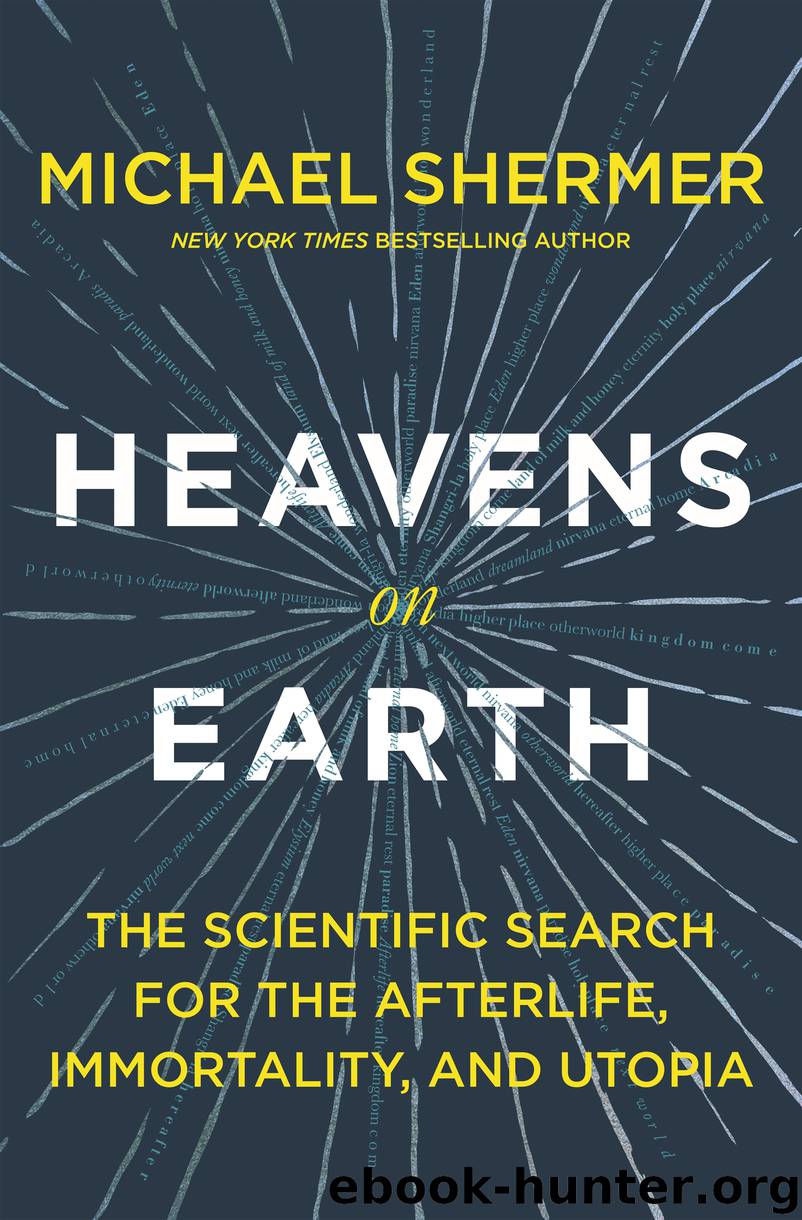Heavens on Earth by Michael Shermer

Author:Michael Shermer
Language: eng
Format: epub
Publisher: Henry Holt and Co.
THE PTOLEMY VS. COPERNICAN PRINCIPLES: THINKING SKEPTICALLY ABOUT IMMORTALITY
If there is one thing I have learned in a quarter century of professional skepticism, it is this: Beware the prophet who proclaims the end of the world, the apocalypse, doomsday, or judgment day is upon us, or that the second coming, the resurrection, paradise, or the Greatest Thing to Happen to Humanity Ever is coming in the prophet’s own lifetime. The belief that we can transcend what no one before us has arises from our natural inclination to assume that we are special and that our generation will witness the new dawn. Call it the Ptolemaic Principle—the belief, like its namesake’s, that we are not only at the center of the universe but are specially created, chosen people living at a unique time in history. People have always embraced the Ptolemaic Principle, but it is gainsaid by the Copernican Principle, which, pace its namesake, holds that Earth is not the center of the solar system, the solar system is not the center of our galaxy, our galaxy is not the center of the universe, humans are not specially created apart from all other animals, and we are not living in the most important time in history.
Recall, too, the Mediocrity Principle, which states that an item selected at random from a population is most likely to have come from the most numerous type of those items. Reach into a bag containing a thousand Ping-Pong balls, nine hundred of which are white and one hundred black, the chances are pretty good (90 percent, in fact) that you will select a white ball. Pluck someone at random and chances are that that person will represent the population at large. Select any generation of humans from the past and they are likely to resemble those who came just before or after them. Everyone feels special, and every generation believes they are living in special times, but statistically speaking this cannot be true. Thus, the chances that even a science-based prophecy such as those proffered by cryonicists, extropians, transhumanists, singularitarians, and mind uploaders will come true is highly unlikely. Prophets of both religious and secular doom foretell the demise of civilization within their allotted time (and that they will be part of the small surviving enclave while everyone else is left behind). Prognosticators of both religious and secular utopias always include themselves as members of the chosen few, with the paradisiacal state just within reach. Rarely do we hear a scientific futurist or a religious diviner predict that the “big thing” is going to happen in, say, the year 7510. But where’s the hope in that? Yes, proponents of cryonics do make such long-range projections, admitting that the technologies needed to resurrect the frozen dead are likely many centuries in the future, but perhaps that’s why they have so few takers.
Evaluating these science-based theories of immortality, cryonics seems like a better bet than mind uploading, only because without the continuity of self through one’s point of
Download
This site does not store any files on its server. We only index and link to content provided by other sites. Please contact the content providers to delete copyright contents if any and email us, we'll remove relevant links or contents immediately.
| Anthropology | Archaeology |
| Philosophy | Politics & Government |
| Social Sciences | Sociology |
| Women's Studies |
Nudge - Improving Decisions about Health, Wealth, and Happiness by Thaler Sunstein(6629)
iGen by Jean M. Twenge(4694)
The Fire Next Time by James Baldwin(4337)
Adulting by Kelly Williams Brown(3663)
The Sports Rules Book by Human Kinetics(3581)
The Hacking of the American Mind by Robert H. Lustig(3575)
The Ethical Slut by Janet W. Hardy(3494)
Captivate by Vanessa Van Edwards(3292)
Mummy Knew by Lisa James(3164)
In a Sunburned Country by Bill Bryson(2941)
Ants Among Elephants by Sujatha Gidla(2920)
The Worm at the Core by Sheldon Solomon(2910)
Suicide: A Study in Sociology by Emile Durkheim(2606)
The Slow Fix: Solve Problems, Work Smarter, and Live Better In a World Addicted to Speed by Carl Honore(2570)
Humans of New York by Brandon Stanton(2376)
Handbook of Forensic Sociology and Psychology by Stephen J. Morewitz & Mark L. Goldstein(2376)
Blackwell Companion to Sociology, The by Judith R. Blau(2314)
The Happy Hooker by Xaviera Hollander(2272)
Outliers by Malcolm Gladwell(2254)
